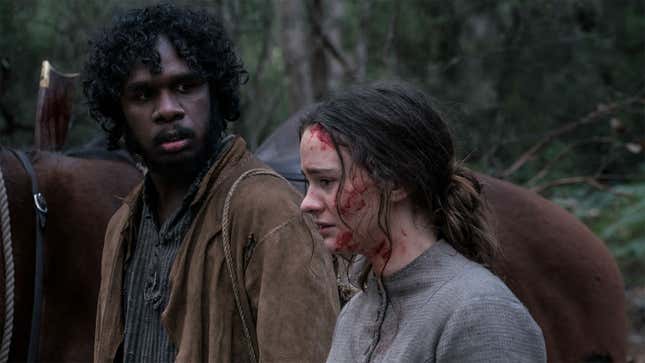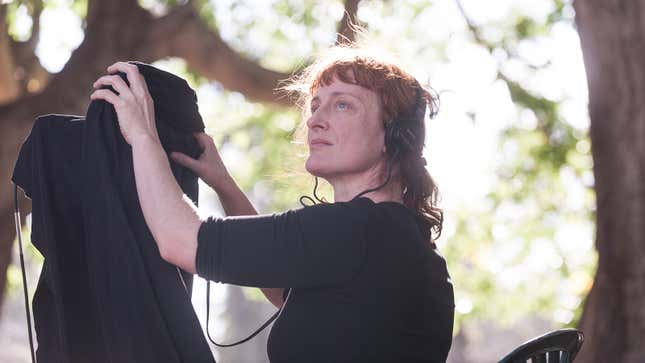Jennifer Kent's Brutal New Film The Nightingale Spits on Your Colonialism
Entertainment
Image: IFC Films
By now, you have probably heard a thing or two about writer-director Jennifer Kent’s follow-up to her beloved film The Babadook. Many of The Nightingale’s scenes make that 2014 movie, widely regarded as one of the scariest of its time, look like kids’ stuff. Destined for “all-time most shocking” lists, it’s the kind of movie whose reputation precedes it. This is true for the majority of its potential audience—ahead of its commercial release (August 2), many reports on its early festival screenings have focused on jeers and walkouts.
At the same time, it is acclaimed—at the time of publication it holds an 82 percent on Rotten Tomatoes. It is, then, some of the best things a movie can be: divisive, visceral, and demanding. It’s hard to imagine anyone in the world saying, “Meh,” upon leaving the theater. Set in Tasmania in 1825, during the colonization of Australia (a time often referred to as the “Black War”), The Nightingale opens on indentured servant Clare (Aisling Franciosi), a convict from Ireland who’s used and abused by her British master Lieutenant Hawkins (Sam Claflin) in a number of ways. He makes her sing for his harassing troops (she sings a song about a nightingale and is figuratively one herself), and he rapes her. Repeatedly. And that isn’t the half of it.
The sadism and disregard Clare faces will be excruciating for any compassionate viewer to sit through. (Kent, in fact, suggests not sitting through her movie if the subject matter is too disturbing.) A desperate Clare seeks revenge with the aid of an Aboriginal guide named Billy (Baykali Ganambarr), who has also experienced devastation at the hands of white men, who have murdered and exploited his people. The pairing is initially contentious—Clare is a racist and Billy is sick of working for white people despite having few other choices for making money. And then, they find an unexpected sort of harmony.
It is about as obsessively built as Robert Eggers’s The Witch… a true cinematic labor of love that is brazenly heinous and beautiful, in turn.
Kent is protective of her film. She has firm ideas of what it is and isn’t. Despite it having the rough outline of a rape-revenge film (raped woman seeks vengeance), she insists it does not belong categorized in a subgenre whose films are often morally ambiguous at best when they aren’t out and out exploitation vehicles that eroticize rape. “The film is ultimately about empathy, love, compassion, kindness in the face of very difficult times,” she told Jezebel earlier this week by phone. She bristled when I suggested that she had centered a white woman in a film about the colonization of indigenous people (“Not really, I mean, it doesn’t at all”). This is somewhat debatable—though the film is told from Clare’s point of view and it’s called The Nightingale, Billy’s own trauma is crucial to the plot and especially its resolution—but Kent wasn’t up for a debate: She knows her film, she knows what she did, and that’s that. She says she feels strongly about this movie, which she researched for about five years and employed multiple on-set experts, including Jim Everett, the film’s Aboriginal consultant, and language consultant Theresa Sainty. It is about as obsessively built as Robert Eggers’s The Witch (or, for that matter, Anna Biller’s The Love Witch), a true cinematic labor of love that is brazenly heinous and beautiful, in turn.
We talked about her uncompromising vision, her commitment to historical accuracy, rape on screen, and the varied responses she’s received. An edited and condensed transcript of our conversation is below.
JEZEBEL: From where I sit, it seems like this movie is controversial even before most people have had the chance to see it. I wonder if that’s your perception as well.
JENNIFER KENT: It’s a little mystifying. It’s a war film, and it’s based on historical truths. Things that have happened in my country. War is not pretty, and if it’s shaking the tree and getting people to look at the fallout of war from this particular perspective, I don’t think that’s a bad thing. It’s not that I ever intended to provoke or be controversial; I just intended to tell a story from a very well-researched, authentic, and true perspective. Violence is shocking, horrifying, and heartbreaking. The responses that I’ve personally received have been acknowledging that. It’s been very moving for me to see.
I don’t use social media. I don’t go to that place because it’s a cesspool of random comments from strangers, often people who haven’t seen the film.
Rape is but one of the atrocities you portray on screen, and yet it seems to be what most people cite or have issues with when discussing this movie. Has that been your experience?
-

-

-

-

-

-

-

-

-

-

-

-

-

-

-

-

-

-

-

-

-

-

-

-

-

-

-

-

-

-

-

-

-

-

-

-

-

-

-

-









































